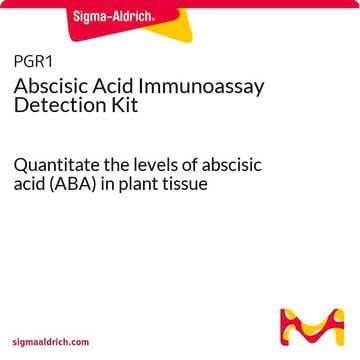A4906
(+)-Abscisic acid
≥98% (HPLC), powder, growth regulator
Synonyme(s) :
(S)-5-(1-Hydroxy-2,6,6-trimethyl-4-oxo-2-cyclohexen-1-yl)-3-methyl-(2Z,4E)-pentadienoic acid, ABA, Dormin
About This Item
Produits recommandés
product name
(+)-Abscisic acid, ≥98% (HPLC)
Pureté
≥98% (HPLC)
Forme
powder
Application(s)
agriculture
Température de stockage
−20°C
Chaîne SMILES
CC(\C=C\[C@@]1(O)C(C)=CC(=O)CC1(C)C)=C\C(O)=O
InChI
1S/C15H20O4/c1-10(7-13(17)18)5-6-15(19)11(2)8-12(16)9-14(15,3)4/h5-8,19H,9H2,1-4H3,(H,17,18)/b6-5+,10-7-/t15-/m1/s1
Clé InChI
JLIDBLDQVAYHNE-YKALOCIXSA-N
Vous recherchez des produits similaires ? Visite Guide de comparaison des produits
Application
- as a supplement for the germination of Arabidopsis thaliana seeds
- as a component of buffered nodulation medium to check its effects on lateral root density (LRD) in leguminous and non-leguminous plants
- as a standard to study its effects on root meristem defects in Medicago truncatula latd mutant
Actions biochimiques/physiologiques
Autres remarques
Mention d'avertissement
Warning
Mentions de danger
Conseils de prudence
Classification des risques
Aquatic Acute 1 - Aquatic Chronic 1
Code de la classe de stockage
11 - Combustible Solids
Classe de danger pour l'eau (WGK)
WGK 3
Point d'éclair (°F)
Not applicable
Point d'éclair (°C)
Not applicable
Équipement de protection individuelle
Eyeshields, Gloves, type N95 (US)
Certificats d'analyse (COA)
Recherchez un Certificats d'analyse (COA) en saisissant le numéro de lot du produit. Les numéros de lot figurent sur l'étiquette du produit après les mots "Lot" ou "Batch".
Déjà en possession de ce produit ?
Retrouvez la documentation relative aux produits que vous avez récemment achetés dans la Bibliothèque de documents.
Les clients ont également consulté
Notre équipe de scientifiques dispose d'une expérience dans tous les secteurs de la recherche, notamment en sciences de la vie, science des matériaux, synthèse chimique, chromatographie, analyse et dans de nombreux autres domaines..
Contacter notre Service technique










